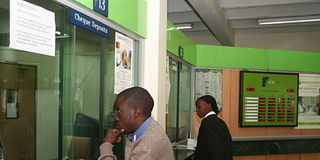Banks cut dividend payout to finance expansion initiatives

Customers at a Kenya Commercial Bank branch in Nairobi. Photo/FILE
What you need to know:
- Kenya Bankers Association chairman Habil Olaka said some of the prudential guidelines issued by the CBK needed gradual implementation, such as financial ratios, but others required instant effecting.
Stiff competition in the banking industry is forcing a change of policy on dividend payout, with most institutions preferring to hold on to their earnings to build a war chest for growth.
Half-year financial results by banks have seen most big players reduce dividend payouts to shareholders.
“Competition is stiff and banks need to meet other capital adequacy ratios in order to finance their future commitments instead of always having to go to the market to borrow funds,” said Mr Kamanda Morara of the Ashanti Consulting Group.
Some of the banks that have cut their dividend payout include Kenya Commercial Bank (KCB), Equity Bank, Barclays Bank of Kenya and National Bank.
Mr Morara said most of the funds paid out to shareholders were almost equal to the amount that banks were seeking when conducting cash calls either through rights issues or using other debt instruments.
Last week, Barclays Bank’s chief financial officer, Mr Yusuf Omari, said the banking industry in Kenya was likely to suffer strain to meet several adequacy ratios in line with regulatory requirements by the Central Bank.
“We are going to see a lot of strain in the industry to be able to meet those ratios,” said Mr Omari during an investor briefing in Nairobi last week.
The lender will pay an interim dividend of Sh0.20 a share compared to the Sh0.30 it paid last year as lower income from lending to homes and companies further hit.
The dividend pay of Sh0.20 is the lowest in two years, having paid a similar amount in the first half of 2011. It paid an interim dividend of Sh0.75 in 2010, the highest in the past five years.
Mr Jeremy Awori, the CEO of Barclays Kenya, said the bank had unveiled a three-year expansion plan that, other than the bank’s core capital base, requires more funds to implement as it seeks to regain its number one position in the sector.
“We also note the importance of reserving cash to maintain our core capital ratios in line with the regulator’s prudential guidelines,” said Mr Awori, adding that going to shareholders to ask for more funds is the last option the bank would go for in case it had to seek funds.
On the spot is also KCB, which has caught the eye of analysts over its core capital ratios compared with other industry averages.
KCB is set to cut its dividend payout as it seeks to shore up its financial muscle to support new investments.
The bank has said it intends to raise the ratio of shareholders’ capital to assets, which at 12.4 per cent is below the industry average of 14.5 per cent.
Banks are expected to back every Sh12.50 lent out to borrowers with one shilling of shareholders’ equity. Last year KCB paid out 46.3 per cent of its net profit to shareholders, being Sh1.90 per share compared to Sh1.85 the previous year.
Kenya Bankers Association chairman Habil Olaka said some of the prudential guidelines issued by the CBK needed gradual implementation, such as financial ratios, but others required instant effecting.
“It definitely takes some time to implement some of the new rules, some of which have a direct or indirect impact to all stakeholders in the industry,” said Mr Olaka.
According to Mr Morara, most shareholders in Kenya have been used to an increasing dividend payout but the picture will change this year as banks cut payouts instead of making cash calls to either fund new plans or meet capital ratio requirements.
However, banks like Cooperative will not be affected as much because historically, the lender has been mean and lean in its dividend payout to shareholders.
Cooperative Bank said last year it would hold its 2013 dividend payout at this year’s level to preserve cash for expansion in Kenya and South Sudan.
This means that the lender will maintain its dividend at Sh0.40, a level it held since last year.
Managing director Gideon Muriuki said the dividend freeze would see the bank transfer an estimated Sh6.5 billion to its retained earnings — ruling out the need for a rights issue or corporate bonds for fresh funds.




